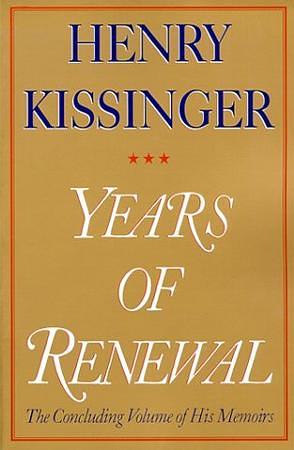
花了一个月零八天,终于在作者辞世之前,看完了基辛格最后一本回忆录Years of Renewal。他在回忆录里谈到国会、参议院时很少有正面言辞,里面充斥着党派政治、各种委员会,动不动就来一个法案,绑住作为行政者的政府的手脚,而且建制的各领袖言论也经常跟其在政府工作时大相径庭,基辛格非常反感,但其实这正是民主的精髓。民主不是为了效率而建立的,某种意义上说,这种体制目的是为了降低效率,让一个国家能更充分地考虑各方面的利益和角度,防止出现一言堂、大的失误。
最后一章中,基辛格对自己8年的政府生涯做了很好的总结,给福特做出了非常正面的评价,说虽然拙于言辞,但看的清大方向,明白轻重缓急,以国家利益而不以个人利益为重,而且有担当,不拿属下当替罪羊,领导力让人钦佩。他关于领导力的论述如下:
Ford achieved all this without histrionics and visible emotional strain largely because he was so unlike the political leaders now brought into prominence by our normal electoral processes. In perhaps no other period has the importance of leadership been more insistently proclaimed. Yet very rarely has it been so difficult to match aspiration with performance. The ultimate task of a leader is to take his society from where it is to where it has never been. But this requires a willingness to travel on the difficult road between a nation’s experience and its destiny. He is bound to be alone at least part of the way until his society’s experience catches up with its possibilities. A leader who travels too much of that journey entirely on his own loses touch with his people and the capacity to shape events—as happened to Woodrow Wilson. A leader unwilling to risk solitary acts will doom himself and his society to stagnation—witness the democratic leaders of Europe between the two world wars. This is why courage is probably the most important single attribute of a successful leader.
他这里说勇是领导人最重要的素质;根据上下文来看,应该还包括视野(站的高看的远);跟民众保持距离,能承受孤独但又不能太远离群众。
美国第56任国务卿也为自己的外交政策方向进行了极为精彩的辩护,间接驳斥了对自己的马基雅维利式政治指责。他可能被批评黑心政客,没有道德感,只是一味地进行实力计算(库尔德人、台湾恐怕不能同意更多),搞幕后交易。在他看来,宣扬美国价值观、传播美国的社会制度是道,维护美国短期的国家利益、维持国际政治均衡是术,两者要综合考虑,不能只顾一头。他认为,民主诞生是几百年的过程,不是一蹴而就的;首先基督教的土壤实现政教分离,让政府知道它是有局限的(“上帝的归上帝,凯撒的归凯撒”);之后的宗教改革让宗教内部多元化变得可能;启蒙运动导致了理性的主导;地理大发现拓展了人类智商的界限;资本主义带来了个人创业精神及极大拓展了中产阶级。伊斯兰和汉文化思想圈是没有这些基础的。伊斯兰政教分离是难以想象的事,古兰经恨不得取代任何宪法;受孔子影响的汉文化,除了主流政府外,没有任何宗教、社会组织被容许挑战政府的权威。
这一段原文如下,基辛格清晰的思路、优雅的文笔可见一斑:
In the West, democracy did not result from a single decision but rather from an evolution extending over centuries. The unique features of the Western pluralistic evolution began with the Catholic Church, which, while hardly democratic in its internal organization, did create the basis for it by insisting on its own distinct governance and by defining the moral order as having a claim superior to that of the state.
This separation of authority between God and Caesar amounted to the first step toward political pluralism and the limitation of state power. Centuries later, pluralism became institutionalized when the Reformation broke up the Universal Church by emphasizing the role of the individual conscience. These trends were accelerated by the Enlightenment, which stressed the dominance of reason; by the Age of Discovery, which stretched intellectual horizons; and by capitalism, which rewarded individual autonomy and initiative and enlarged the middle class.
No other culture has produced a similar evolution. In Islamic societies, the separation of mosque and state is complicated because, for the true believers, the words of the Koran must permeate every aspect even of secular life. Inevitably secularization leads to tensions with religion. In most Confucian societies, neither religion nor nongovernmental groups have had the organization, the autonomy, or the doctrine to encourage the emergence of an alternative center of political authority.
本书出版于1997年,他这个观点对吗?穆斯林我不熟。日本、韩国、台湾已经走在前头了?
下载在这里
